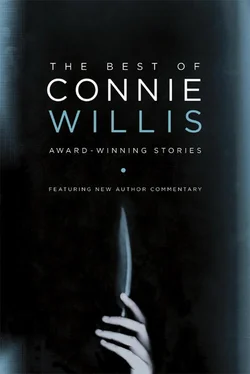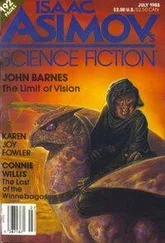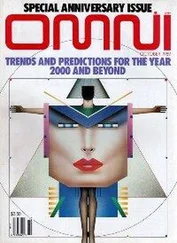“Yes,” Dunworthy had said. “We can.” End of conversation.
“Two days!” I had shouted at my roommate Kivrin. “All because some computer adds an apostrophe s.
“And the esteemed Dunworthy doesn’t even bat an eye when I tell him. ‘Time travel is not like taking the Tube, young man,’ he says. ‘I’d suggest you get ready. You’re leaving day after tomorrow.’ The man’s a total incompetent.”
“No,” she said. “He isn’t. He’s the best there is. He wrote the book on St. Paul’s. Maybe you should listen to what he says.”
I had expected Kivrin to be at least a little sympathetic. She had been practically hysterical when her practicum got changed from fifteenth- to fourteenth-century England, and how did either century qualify as a practicum? Even counting infectious diseases, they couldn’t have been more than a five. The Blitz is an eight, and St. Paul’s itself is, with my luck, a ten.
“You think I should go see Dunworthy again?” I said.
“Yes.”
“And then what? I’ve got two days. I don’t know the money, the language, the history. Nothing.”
“He’s a good man,” Kivrin said. “I think you’d better listen to him while you can.” Good old Kivrin. Always the sympathetic ear.
The good man was responsible for my standing just inside the propped-open west doors, gawking like the country boy I was supposed to be, looking for a stone that wasn’t there. Thanks to the good man, I was about as unprepared for my practicum as it was possible for him to make me.
I couldn’t see more than a few feet into the church. I could see a candle gleaming feebly a long way off and a closer blur of white moving toward me. A verger, or possibly the Very Reverend Dean himself. I pulled out the letter from my clergyman uncle in Wales that was supposed to gain me access to the Dean, and patted my back pocket to make sure I hadn’t lost the microfiche Oxford English Dictionary, Revised, with Historical Supplements I’d smuggled out of the Bodleian. I couldn’t pull it out in the middle of the conversation, but with luck I could muddle through the first encounter by context and look up the words I didn’t know later.
“Are you from the ayarpee?” he said. He was no older than I am, a head shorter and much thinner. Almost ascetic-looking. He reminded me of Kivrin. He was not wearing white, but clutching it to his chest. In other circumstances I would have thought it was a pillow. In other circumstances I would know what was being said to me, but there had been no time to unlearn sub-Mediterranean Latin and Jewish law and learn Cockney and air-raid procedures.
Two days, and the esteemed Dunworthy, who wanted to talk about the sacred burdens of the historian instead of telling me what the ayarpee was.
“Are you?” he demanded again.
I considered whipping out the OED after all on the grounds that Wales was a foreign country, but I didn’t think they had microfiche in 1940. Ayarpee. It could be anything, including a nickname for the fire watch, in which case the impulse to say no was not safe at all. “No,” I said.
He lunged suddenly toward and past me and peered out the open doors. “Damn,” he said, coming back to me. “Where are they, then? Bunch of lazy bourgeois tarts!” And so much for getting by on context.
He looked at me closely, suspiciously, as if he thought I was only pretending not to be with the ayarpee. “The church is closed,” he said finally.
I held up the envelope and said, “My name’s Bartholomew. Is Dean Matthews in?”
He looked out the door a moment longer as if he expected the lazy bourgeois tarts at any moment and intended to attack them with the white bundle, then he turned and said, as if he were guiding a tour, “This way, please,” and took off into the gloom.
He led me to the right and down the south aisle of the nave. Thank God I had memorized the floor plan or, at that moment, heading into total darkness, led by a raving verger, the whole bizarre metaphor of my situation would have been enough to send me out the west doors and back to St. John’s Wood. It helped a little to know where I was. We should have been passing number twenty-six: Hunt’s painting The Light of the World —Jesus with his lantern—but it was too dark to see it. We could have used the lantern ourselves.
He stopped abruptly ahead of me, still raving. “We weren’t asking for the bloody savoy, just a few cots. Nelson’s better off than we are—at least he’s got a pillow provided.” He brandished the white bundle like a torch in the darkness. It was a pillow, after all. “We asked for them over a fortnight ago, and here we still are, sleeping on the bleeding generals from Trafalgar because those bitches want to play tea and crumpets with the tommies at victoria and the hell with us!”
He didn’t seem to expect me to answer his outburst, which was good, because I had understood perhaps one key word in three. He stomped on ahead, moving out of sight of the one pathetic altar candle and stopping again at a black hole. Number twenty-five: stairs to the Whispering Gallery, the dome, the library (not open to the public.)
Up the stairs, down a hall, stop again at a medieval door and knock. “I’ve got to go wait for them,” he said. “If I’m not there they’ll likely take them over to the abbey. Tell the Dean to ring them up again, will you?” and he took off down the stone steps, still holding his pillow like a shield against him.
He had knocked, but the door was at least a foot of solid oak, and it was obvious the Very Reverend Dean had not heard. I was going to have to knock again. Yes, well, and the man holding the pinpoint had to let go of it, too, but even knowing it will all be over in a moment and you won’t feel a thing doesn’t make it any easier to say, “Now!”
So I stood in front of the door, cursing the history department and the esteemed Dunworthy and the computer that had made the mistake and brought me here to this dark door with only a letter from a fictitious uncle whom I trusted no more than I trusted the rest of them.
Even the old reliable Bodleian had let me down. The batch of research stuff I’d cross-ordered through Balliol and the main terminal is probably sitting in my room right now, a century out of reach. And Kivrin, who had already done her practicum and should have been bursting with advice, walked around as silent as a saint until I begged her to help me.
“Did you go to see Dunworthy?” she said.
“Yes. You want to know what priceless bit of information he had for me? ‘Silence and humility are the sacred burdens of the historian.’ He also told me I would love St. Paul’s. Golden gems from the Master. Unfortunately, what I need to know are the times and places of the bombs so one doesn’t fall on me.” I flopped down on the bed. “Any suggestions?”
“How good are you at memory retrieval?” she said.
I sat up. “I’m pretty good. You think I should assimilate?”
“There isn’t time for that,” she said. “I think you should put everything you can directly into long-term.”
“You mean endorphins?” I said.
The biggest problem with using memory-assistance drugs to put information into your long-term memory is that it never sits, even for a microsecond, in your short-term memory, and that makes retrieval complicated, not to mention unnerving. It gives you the most unsettling sense of déjà vu to suddenly know something you’re positive you’ve never seen or heard before.
The main problem, though, is not eerie sensations but retrieval. Nobody knows exactly how the brain gets what it wants out of storage, but short-term is definitely involved. That brief, sometimes microscopic, time information spends in short-term is apparently used for something besides tip-of-the-tongue availability. The whole complex sort-and-file process of retrieval is apparently centered in short-term, and without it, and without the help of the drugs that put it there or artificial substitutes, information can be impossible to retrieve. I’d used endorphins for examinations and never had any difficulty with retrieval, and it looked like it was the only way to store all the information I needed in anything approaching the time I had left, but it also meant that I would never have known any of the things I needed to know, even for long enough to have forgotten them. If and when I could retrieve the information, I would know it. Till then I was as ignorant of it as if it were not stored in some cobwebbed corner of my mind at all.
Читать дальше












